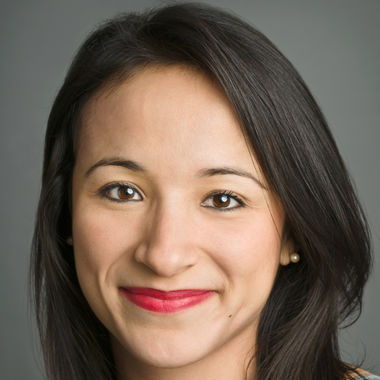P.D. Soros Fellowship for New Americans
If you are an applicant and need to sign into the online application, you can find the link on the "Apply" page of our website: Apply Page.
If you are a fellow looking to login, please note that we are currently updating our backend system for managing Fellow data. In the meantime, to update your information for the Fellowship, please send updates to Nikka Landau at nlandau@pdsoros.org.
Q&A: Bianca Tylek Founds Non-Profit To Decommercialize the Criminal Justice System
After years of advocacy and education around crime and punishment, 2014 Paul & Daisy Soros Fellow Bianca Tylek recently founded Worth Rises, formerly the Corrections Accountability Project, at the Urban Justice Center to address the commercialization of criminal justice. Worth Rises strives to eliminate the influence of commercial interests on the criminal legal system and end the financial exploitation of those it touches. At its onset, the organization will focus on the outsourcing of ancillary prison services from healthcare to commissary and utilize a three-prong strategy that includes advocacy, responsible contracting, and impact litigation.
Bianca was born to a Polish father and Ecuadorian mother in New York. In high school, Bianca attended her boyfriend’s funeral after his murder and visited friends suffering from heroin addiction in rehab. Yet, her academic success led her to Columbia University and eventually a career on Wall Street. After a few years, Bianca transitioned into the social sector, working in growth strategy for Teach for America and developing College Pathways, an innovative program that prepares prisoners at Rikers Island for college-level education. The Paul & Daisy Soros Fellowships for New Americans supported her graduate degree at Harvard Law School. She graduated in 2016.
HOW DID YOU DECIDE TO FOUND Worth Rises- WAS THERE AN ‘AHA MOMENT’ FOR YOU OR HAS THIS BEEN IN THE WORKS FOR A LONG TIME?
So, it came as a surprise to me, but there actually was. I had just left this ivory tower think tank. It had excellent brand recognition, but I wanted to be closer to the stakeholders—the decision makers and the affected communities. The problem was that my work was focused on this super wonky strategy: prison service contracting. I was trying to provide one answer to the privatization trend in criminal justice today. But as I started to survey the advocacy landscape, looking for a home for my work, I realized that there wasn’t an organization focused on addressing the broader issue of justice commercialization. There were organizations that focused on the privatization of one specific point of the punishment continuum, but it seemed to be an issue that needed a more comprehensive approach or at the very least someone’s direct attention. After all, advocates are always talking about how commercial interests corrupt our criminal legal system. Well, my unique background in financial services and law and personal connection to the justice system, gave me the distinctive tools to pursue that mission. I thought to myself, if not me, who? If not now, when?
WHERE ARE YOU BASING THE ORGANIZATION?
Though particularly egregious in certain regions, particularly the conservative south, the commercialization of criminal justice is a national problem that spans all jurisdictions. Accordingly, the Corrections Accountability Project (now Worth Rises) will also operate at the national level. However, we are based in New York City out of the Urban Justice Center, a social justice incubator for organizations advocating on behalf of impoverished communities.
WHAT INITIATIVE ARE YOU MOST EXCITED TO WORK ON THIS YEAR?
That’s a tough question. Every facet of the project is interesting and critical to decommercializing criminal justice. Now, obviously, as a start-up with limited capacity, we have to start somewhere. So, for now, we’re focusing on the privatization of ancillary prison services, which includes everything from healthcare to transportation. We have developed three strategies to address the issues around this practice: advocacy, responsible contracting, and impact litigation. As we grow, our core work will expand and our strategies will evolve.
WHO HAS BEEN MOST INSTRUMENTAL IN HELPING YOU GET THE ORGANIZATION OFF OF ITS FEET?
I’ve been blessed with a tremendous amount of support. Among my most instrumental supporters would probably be Doug Lasdon, the Executive Director of the Urban Justice Center, who saw the impact potential of the project early and believed in my ability to bring it to fruition successfully. In giving me a home at the Urban Justice Center as its newest project, he gave me with the autonomy to start and grow the Corrections Accountability Project according to my vision. With that said, of course, I’m also thankful for my early funders who have committed seed capital to getting the Corrections Accountability Project off the ground and those who are currently considering such contributions. Clearly, without that support, launching a non-profit would be impossible. Finally, I’m grateful for the encouragement of the advocacy community, which has been particularly supportive. Advocates from across that criminal justice landscape have taken calls, made introductions, and offered their partnerships—all of which will prove vital to our success. After all, collaboration across the criminal justice advocacy space is critical to dismantling our nation’s dependence on incarceration.
HOW CAN OTHER PAUL & DAISY SOROS FELLOWS HELP THE ORGANIZATION?
As one might imagine, one important way to show support is to make a contribution and/or make an introduction to someone who might be interested in donating. Any amount, small or large, is tremendously helpful. If someone is interested in donating to a local community campaign, they could also donate to our active gun buyback campaign. Finally, anyone can spread the word about the Corrections Accountability Project by sharing our website with friend or following us on Facebook and Twitter @correctionproj. Every type and level of support is greatly appreciated.
© 2024
